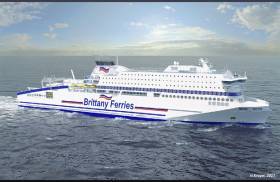Displaying items by tag: Newbuild LPG ordered
#NewBuild - Almost exactly a year after the Brexit vote, Brittany Ferries on Thursday confirmed an order for a new "£175m LNG cruiseferry for English Channel service.
The 42,400 gross tonnage newbuild (slighty larger to Pont-Aven of 41,000 on the Cork-Roscoff route) will be placed on the company’s busiest route Portsmouth-Caen from spring 2019 – as Brexit negotiations move towards completion.
The new ship will be named Honfleur after the charming seaside destination on the Seine estuary in Normandy. First details have been revealed today after contracts were signed with the Flensburger Schiffbau-Gesellshaft (FSG) shipyard in Germany.
Afloat adds FSG are currently constructing ICG's €144m euro newbuild cruiseferry for Irish Ferries. The 50,000 gross tonnage cruiseferry is due to enter operations by mid-2018.
As for Honfluer, she will be powered by LNG (liquefied natural gas) and promises to be the most environmentally-friendly vessel operating on the English Channel. LNG emits less carbon dioxide than diesel following combustion and burns with no smoke. It is entirely free of sulphur and produces very low emissions of nitrogen oxide and particulate matter.
In LNG-electric propulsion, four engines feed electric generators and two electric propulsion motors. This quieter and more efficient form of power delivery reduces vibration, meaning an even smoother ride for passengers.
























































